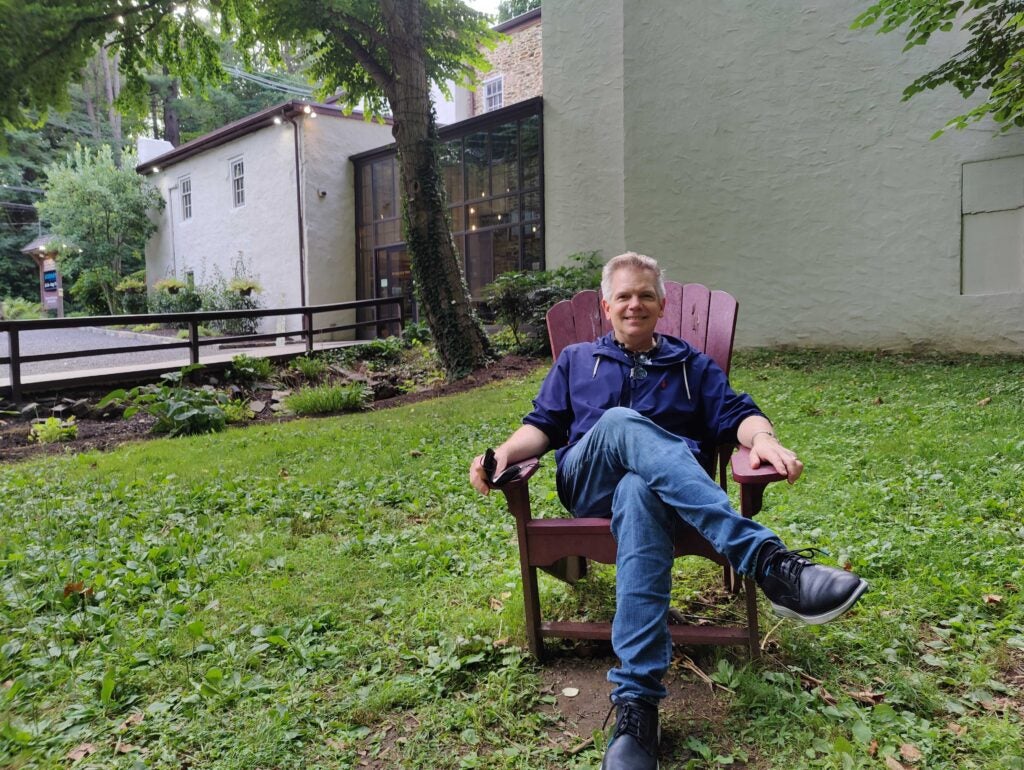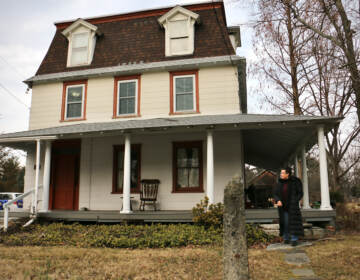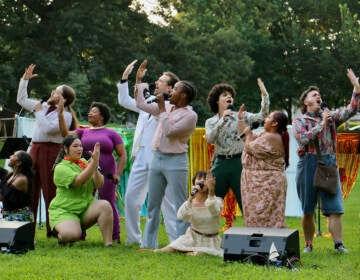What did the pandemic do to your favorite theater company? Some survived, others didn’t make it
The pandemic caused an existential crisis for many small theaters and theater companies in the Philadelphia area.
Listen 3:00
Actors at Hedgerow Theatre perform a fight scene from ''A Midsummer Night's Dream,'' set in a boarding school and reimagined with same-sex romantic partners by Mauckingbird Theatre. (Peter Crimmins/WHYY)
From Philly and the Pa. suburbs to South Jersey and Delaware, what would you like WHYY News to cover? Let us know!
When Hedgerow Theatre approached Peter Reynolds and his Mauckingbird Theatre Company last year to co-produce an LGBTQ version of Shakespeare’s “A Midsummer Night’s Dream,” “it felt like a no-brainer,” Reynolds said.
Hedgerow had the resources to support a 20-member cast. It also had the capacity to mount the production in the bucolic setting of its theater in Media, Pennsylvania. The theater, housed inside a former grist mill, is adjacent to a gently gurgling creek.
“This is such a beautiful place,” Reynolds said. “You see, as we’re sitting here, it just felt like such a great place to do ‘Midsummer Night’s Dream.’”
The co-production is pulling Mauckingbird Theatre out of a five-year nap.
The pandemic shutdown caused an existential crisis for many small theater companies such as Mauckingbird. Some of the organizations quickly pivoted to stay relevant by adapting to changing audience behaviors and funding streams. Others went dormant, opting to wait it out. Still, others quietly threw in the towel.
Mauckingbird had the advantage of being a small company with no payroll or overhead, and Reynolds has a full-time job teaching theater at Temple University. So it was easy to put the company on hold indefinitely.
“When you’re not doing it, you realize, ‘Wow, that’s a lot of work and we were doing it ourselves,’” he said. “Incredibly rewarding, but it was a real time of reflection: What is it we’re doing, and do we want to keep doing it?”

Reynolds said he was in no hurry to return from the pandemic pause.
The company, founded in 2008, had been staging LGBTQ-centered plays about twice a year until COVID hit. The last play was in September 2019 — Joshua Harmon’s “Significant Other,” followed by a cabaret with Dito van Reigersberg, also known as Martha Graham Cracker, in early 2020, “before the world shut down,” said Reynolds.
In the last few years, Reynolds relieved himself of the pressure of putting on a season, instead waiting for an opportunity to come knocking. He has been waiting patiently for the licensing to come available for the new gay version of the 1960 Tom Jones musical “Fantasticks.”
The offer from Hedgerow came at a time when Reynolds was ready to return from the pandemic. “This finally felt like the right time and the right collaboration to put our foot back in and hopefully return,” he said.
But not everyone had the same luxury of time and resources.
Tribe of Fools, another small Philadelphia theater company, called it quits… sort of.
“It’s kind of like Obi-Wan Kenobi at the end of ‘Star Wars,’” said company co-founder Terry Brennan.
For the “Star Wars” illiterate: When the mystical vessel of the Force, played by Alec Guinness, was slain by Darth Vader’s lightsaber, his physical body disappeared under a puddle of empty clothes while his spirit continued to guide Luke Skywalker to destroy the Death Star.
Tribe of Fools no longer has a corporeal presence in the city. Many of its core members have scattered across the country. It’s unlikely the company will coalesce here again.
Brennan said that even before the COVID troubles, Tribe found it difficult to keep going.
Since its inception in 2013, the company had been creating original, acrobatic-oriented theater, becoming a regular favorite at the Philly Fringe Festival. But Brennan was often left bruised and battered after Tribe’s aggressive performances, which never made much money.
Full disclosure: I was asked to do a walk-on cameo in Tribe of Fools’ 2015 play “Zombies… With Guns,” as an ill-fated zombie.
When COVID forced Brennan to stop, he found himself dreading a return.
“Tribe of Fools was really blessed to have audiences ask, ‘What are you doing next?’ Not everyone gets that,” Brennan said. “So then when you’re, like, ‘I don’t know if I want to do it anymore,’ it felt ungrateful.”
“I felt really guilty that I didn’t want to jump back into such a grind,” he said.

Brennan, 48, considered what he wanted out of theater and his personal life and decided to seek opportunities in Canada with its public health care system. He now teaches at a circus school in Vancouver.
“I needed a lot of time to kind of do nothing and think about what I wanted to do,” he said. “I ended up missing it. That was important: I missed making and presenting work.”
Brennan said he will be back for the Philly Fringe with a solo show, ADHD Mixtape, loosely based on his own upbringing and his experience coping with attention deficit hyperactivity disorder.
He said it is the most physically demanding performance he has ever done. It’s also a lot easier. Brennan is able to come to Philly Fringe because of the emergence of hubs, a system of mini-festivals within the Fringe wherein artists share resources and spaces. Brennan will be performing “ADHD Mixtape” with the Circus Campus hub in Mt. Airy.
“I could not have done this without Circus Campus or without the hub system,” he said. “If I had to do it the way I used to do it in Philadelphia, I just don’t have the money. This hub system is going to be really good for younger artists up and coming.”
Some companies have become less productive as they adjust to a post-pandemic theater scene.
Simpatico, since its founding in 2005, had staged two or three productions every year.
Since 2020, the company has staged one play, Charlie DelMarcelle’s award-winning “The Shadow That Broke the Light” in 2021. In 2024, the company did a co-production with Azuka Theatre of R. Eric Thomas’ “Army of Lovers.”
Simpatico also produces the annual showcase of Black playwrights, Jouska PlayWorks, with a series of staged readings of new plays in development.
“It’s about figuring out how to tell the best story any of us can within our resources,” said Artistic Director Allison Heishman. “The funding landscape has absolutely shifted.”
She said the Philadelphia theater community is looking to itself for help by sharing resources and engaging in co-productions to widen their audience reach.
“There’s nothing more frustrating than talking to different people in Philadelphia and having them realize, ‘Oh, that show sounds fantastic! I wish I known it was happening!’” Heishman said. “Partnerships are the new thing, the next wave.”
Simpatico is planning its next fully produced play in 2025, “The Way She Spoke” by Isaac Gomez, set in Juarez, Mexico, which saw a gruesome wave of murdered women in the 1990s.
Simpatico was one of the smallest companies in the region to regularly produce work, but Heishman does not feel like it has to be anymore.
“It’s been really beneficial to be nimble and be a bit scrappy in our programming,” she said. “And let the play that comes across my desk, or is brought to me by different collaborators, be the thing that dictates when and where we produce next.”

Saturdays just got more interesting.
WHYY is your source for fact-based, in-depth journalism and information. As a nonprofit organization, we rely on financial support from readers like you. Please give today.





![CoronavirusPandemic_1024x512[1]](https://whyy.org/wp-content/uploads/2020/03/CoronavirusPandemic_1024x5121-300x150.jpg)


